Kaitlin Sandeno Discusses Finding a Path in Life on Champion’s Mojo Podcast
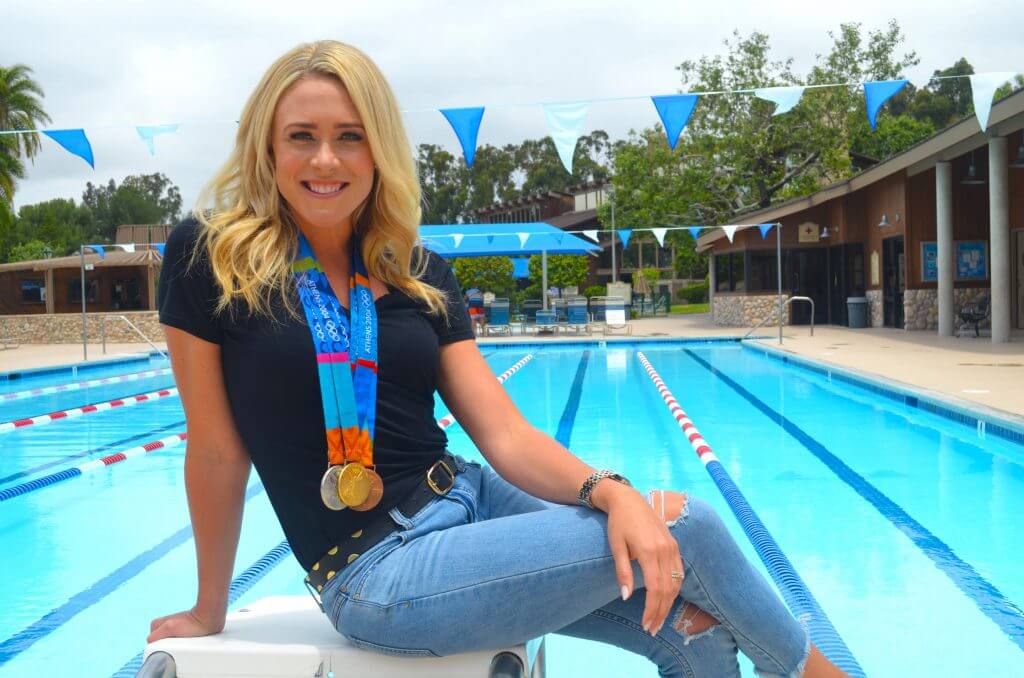
Kaitlin Sandeno Discusses Finding a Path in Life on Champion’s Mojo Podcast
An Olympic gold medalist and the General Manager of the ISL’s D.C. Trident, Kaitlin Sandeno knows that in order to find your true path in life, you have to face your doubts and fears head on. Sandeno talks with the Champion’s Mojo Podcast hosts Kelly Palace and Maria Parker and shares about her decision to brighten the lives of children with cancer and the positive character traits she’s developed as an athlete.
Below is an abridged Q&A, conducted by Palace and Parker. You can listen to the full podcast episode #83 at https://championsmojo.com or by clicking here.
Champion’s Mojo: What have you been up to lately?
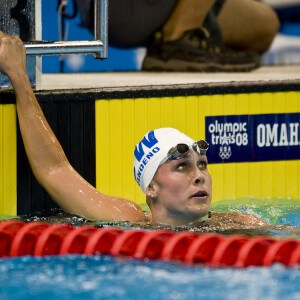
Photo Courtesy: Peter H. Bick
Kaitlin Sandeno: Well, I’m just trying to navigate these waters as we all are. We have been thrown into a unique time and I’m just trying to stay positive and optimistic. This is going to be a big year. It seems to be an Olympic year. I was booked for a lot of amazing opportunities and obviously all of those have either been postponed or moved virtually. I did a lot of motivational speaking and I really enjoyed it. I’m thrilled to be able to say that we’ve moved that to a virtual platform and have been connecting with different teams around the country and just spending time with them, helping to inspire, engage, motivate, and kind of help them during this challenging time. I think a lot of coaches have been trying to think outside the box. I get some great questions and some really nice engagement. Other than that, the ISL is continuing to grind forward. We’ve had to think outside the box going into Season 2. Then, besides that, just trying to find ways to fit in at home exercise. I find that, when you retire, it’s a little bit more challenging to self motivate. I think it’s good both physically and mentally to stay present in some form of exercise. I need that type of release. Luckily my husband and I are pretty darn close to the ocean so we have a nice little getaway. Me and my husband have been trying to do our part with social distancing. I try to say physical distancing instead of social, since people need to be social. We just need to be less physical or keep that distance from others. So we have been trying to do our part: wear a mask, wash your hands over, and be smart. My mom and sister are both cancer survivors. My sister is still actually going through treatment right now. My father-in-law had open heart surgery in the middle of a pandemic two weeks ago. We have very close loved ones that we are just trying to protect. I would rather see my family members than go to a bar for an hour or two. I’m just trying to not get too stir crazy and keep myself busy. Some days are better than others. It’s kind of learning to give myself grace on the days that are a little bit more challenging, I guess you can say.
Champion’s Mojo: What do you do when you do get a little bit down?
Kaitlin Sandeno: Every day, I try to show up as the best version of myself. Some days can be good, and some days things could be better. I think it’s important that we accept those days. I think it’s important you’re honest with your loved ones about those states too. It’s just my husband and I, and some days I’m like, “I’m not doing so good today.” I have cabin fever and I’m getting kind of bored. I think it’s important that you own up to it and you don’t just try to shove it down. I think it’s really important to try to communicate with people and reach out and check on your loved ones and your friends. I think if we can be the best versions of ourselves we can help other people do the same. I think more than ever that’s what we need right now. We need to lift each other up, but we need to look out for each other. I definitely have my days that I struggle. Sometimes I just need to just go for a walk. The other day I watched Hamilton. Every day is a little different, but I think it’s really important for you to try not to socially distance yourself because it can sometimes get you into a lonely place.
Champion’s Mojo: What can you share with us about the upcoming ISL season two and tell us about the D.C. Trident’s all women’s staff?
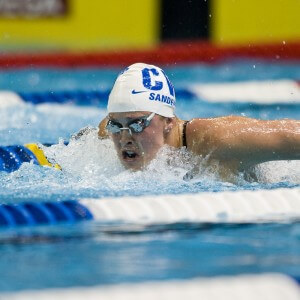
Photo Courtesy: Peter H. Bick
Kaitlin Sandeno: Last season all three of my coaches were female, along with one of my massage therapists, my team manager, and myself. Only one of our other massage therapists was male. I was proud of that. They were beyond qualified and rightfully deserved to be there. It was really good vibes. I’m all about vibes. I need people that match my culture and what it is I want to establish. These women were just phenomenal. They brought so much positive energy and they connected so well with the athletes. The male athletes responded well to it too. I think we just did things differently. Our head coach, Cyndi Gallagher, who’s been at UCLA for years and years and years, is a legend in her own right. After meets she would have a sit down and ask each athlete what they were proud of, whether it was themselves or a teammate. It was really neat to have these athletes open up and they don’t even all really know each other that well. We started this culture that we’re in this together and we are a team. I know we’re coming from all across the world, but we’re part of something truly iconic and just revolutionizing our sport and we embraced it. I’m really proud of that moving forward for season two. Obviously we’re at the mercy of this virus. The top priority is our athletes’ safety. The goal is now to switch to a type of a camp environment instead of traveling all over the world. The idea is for all 10 teams to be in one location where they will train together and compete. I will share that D.C. Trident’s roster is full at this time. Athletes are excited and ready to go. I was a little apprehensive in the beginning to reach out because this is basically when everybody’s world just got rocked with either NCAAs coming to a halt and the postponement of the Olympics. I didn’t want to just get on the phone and start calling up athletes because I knew your world was rocked. I really wanted to be sympathetic and just be a little bit more respectful of their emotions because obviously everybody was handling it so much differently. It was very well received. Athletes were excited to have something to look forward to. They are all very understanding and patient that this is going to be a process to get it locked in. And once it does, it’s all going to move really quickly. I really hope we’re able to provide this one of a kind training and competitive environment, which, for my knowledge has never been done before.
Champion’s Mojo: Have you been able to get sponsorships for the D.C. Trident?
Kaitlin Sandeno: You know, that is challenging. If there’s anybody out there that would love to sponsor D.C. Trident, I would absolutely be thrilled to connect. We’re in a tough financial time for a lot of people in all different avenues, and especially in the world of sports. Last season we had some great sponsors locally but this year, since we don’t have any needs in the D.C. area, it’s a little bit more challenging. Having said that we’re waiting to get a little bit more locked in with the media. That’s obviously a little bit more leverage to bring to potential sponsors. We haven’t even been able to announce our location and our date either. Moving forward, that is the ultimate goal. To start building sponsors and start really helping build and grow the sport so it’s popular more than every four years.
Champion’s Mojo: As the general manager, what are you responsible for? Do you have to negotiate salaries with athletes?
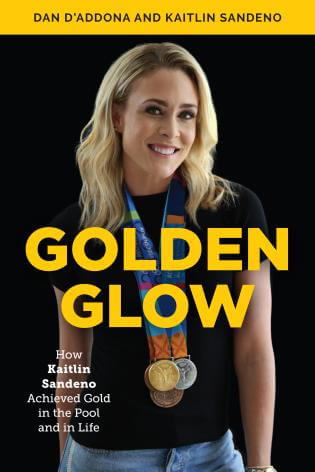
Photo Courtesy: Rowman & Littlefield
Kaitlin Sandeno: At this point, since we’re a startup, I do a lot. Securing the roster, staff, one head coach, two assistant coaches, massage therapists, and team manager. I do all the PR. I’ve been trying to engage with interns to help me with that. The accounting, the sponsors. You name it, I’ve had to do it just because we’re a startup. I would love, and really look forward to as this league progresses, to build a staff and be equipped with people that do things better than I can. I can fake it till I make it, but I’m by no means an expert in those different avenues. It’s been an amazing learning opportunity for me. I’m proud of stepping into something new for myself and being proud with how it went in the first season. I’m really proud of the culture we were able to build.
Champion’s Mojo: What is the team culture like?
Kaitlin Sandeno: As a culture, we aim to be accepting, respectful professionals. I want them to look like professionals and I want to treat them like professionals. I have to catch myself because a lot of times I refer to them as kids or my kids. They’re not kids. They’ve graduated college. They are in their early 20s, some of them mid to late 20s. Some of them married. Some of them are expecting children. I remember when I was a pro swimming for club Wolverine for Bob Bowman and Jon Urbanchek. John really made us act like adults. We knew what we needed to do. We knew when it was appropriate to go out and when not to. That’s what I wanted to start with this team. There’s obviously a code of conduct but I shouldn’t have to be like checking on them and having them sign in and stuff like that. I just felt like I was there to be their biggest cheerleader. By the end of our trip everyone was like Kaitlin, you’re the best team mom ever. I just wanted to support them and love them and let them know their value and that we’re all in this together. Even though my team had Katie Ledecky on it last year, I valued everyone the same. When you’re at college, you’re a part of a team, and then when you leave college you miss it. I wanted to try to replace that feeling that you’re an individual with the feeling you’re swimming for something more than yourself. You have 31 other swimmers rooting for you to get your hand on that wall and who celebrate your victories and support you.They’re really part of something truly iconic in our sport.
Champion’s Mojo: What have been your biggest challenges with the job?
Kaitlin Sandeno: I’m a very structured person and very organized. I’ve never been a part of a startup to this magnitude before and I’ve really had to learn to go with the flow and be OK with changes. At first I wasn’t very good with that and I overreacted a lot. I’m so grateful to have not only role models, but dear friends in Lenny Krayzelburg and Jason Lezak to help me through this challenging professional time and challenge me in a good way. Things get hard and I’m not afraid of hard work, but it is so much better when you can surround yourself with people that are there to support you. Technically, Jason and Lenny are rivals, but I literally talk to them every single day. It’s been incredible to walk through this process with them and it’s building our friendship even stronger. We are also very grateful to be growing this sport together because we are so grateful for what the sport has done in each and every one of our lives.
Champion’s Mojo: Can you tell us a little about the Jessie Rees Foundation that you’re involved with?
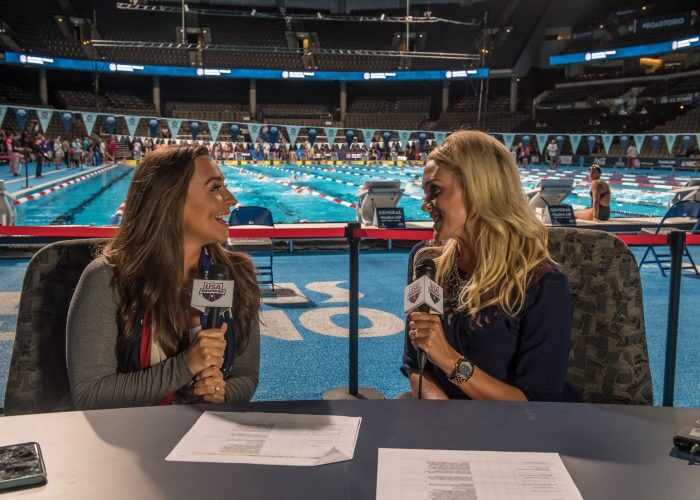
Photo Courtesy: Peter H. Bick
Kaitlin Sandeno: So in 2012 I came on board as a national spokesperson for the Jessie Rees Foundation which is also known as NEGU or Team NEGU. NEGU stands for Never Ever Give Up. Jessica Joy Rees was 11 years old when she was diagnosed with two inoperable brain tumors. When she was going through outpatient treatment at our local hospital here in Orange County, she noticed that some of the kids didn’t get to come and go like she did. She wasn’t sure how long some of the other kids had to stay there so she asked her parents after treatment one day when the other kids got to go home. Her dad had to explain that everybody’s treatment plan is different. So she asked what she could do to help them. Eric and Stacy Reese were just blown away by their daughter’s compassionate heart as she’s going through this tragic event where they don’t have a lot of hope for a cure. Her parents were just overwhelmed with emotion that she was thinking about what she could do for them, so they didn’t brush it off. They found Jessie in her bedroom with those paper bags used to take your lunch in. She was putting all these different toys and stuffed animals and other things in these bags. She was decorating the bags with stickers. Her parents asked her what she was doing and she said she wanted to take them to all the other kids in the hospital. She wanted to brighten their day. So her parents came up with Joyjars, Joy because that’s her middle name and jar because they come in these 64 ounce, clear containers with stickers and decor on the outside. Inside each one is age and gender appropriate and hospital approved items. Socks. Beanies. Crayons. Hot Wheels. If it fits in a Joyjar it’s going in there. The whole purpose, for Jessie, was that she wanted every single child fighting cancer to receive one of these Joyjars. I became involved because Jessie was a swimmer for the Mission Viejo Nadadores and a family brought her story to my attention. They asked if I had anything I could donate to her, just something to encourage her. I found one of my old national team jackets and I signed that and had the family bring it to her. That was kind of the start of our relationship. I just followed everything that she used to post on Facebook and she was just so optimistic and encouraging. I met her when they did a fundraiser for her to help with medical bills when she’s first diagnosed. I met Jessie’s dad who has these really crystal blue eyes and it was like the first time that I ever experienced meeting a stranger and looking in their eyes and just like feeling his pain. I was already so tied to this little girl and, meeting her father, I was just like, oh my gosh, what can I do to help? She ended up passing away 10 months later and her dad and I got reconnected and he invited me to a hospital visit to continue to deliver the Joyjars which Jessie had started. I immediately said yes.I immediately said yes. I had never done something like that before, being in a hospital and around people with cancer. I didn’t know how I would react. I was like Kaitlin, shake it off. I got there Jason Lezak was there too. We did the first room and I just immediately felt like it was my calling. This is where I’m supposed to be. It’s actually kind of hard for me to explain in words. It’s like I feel like I was shaped for this role because I think swimming actually helped me with this role because swimming taught me to have a tough exterior when I need to. You need to not let things phase you, but you have to have a compassionate heart. I have a very compassionate heart and a very loving and affectionate family. I feel like those two blended together really well for me to be able to handle going into these hospital rooms, because people ask me all the time how I do it. I’ve done over one hundred and seventy room visits now and people are like, how do you not just break down and cry every time? There’s strangely an odd amount of joy in these rooms because these children are so brave and optimistic and positive. They’re still so childlike. I look at the older siblings and parents and grandparents. They’re hurting almost as much. The whole thing started on a kind of a local level where I would go to different corporations in the area and share Jessie’s story and let them know our mission and try to raise money. Then I would be on the road, visiting hospitals and delivering Joyjars and trying to continue her mission. The foundation has grown tremendously. It’s worldwide.
Champion’s Mojo: What traits do you think you learned from swimming?
Kaitlin Sandeno: I think time management for sure, especially in high school. I had an upbringing where it wasn’t all about swimming. My parents really emphasized being involved in school and in your community and with your family. I was class president and on yearbook staff and was going to, if not organizing, the school dances and pep rallies while still obviously being a very committed swimmer. I think time management is something that we all struggle with. Not to say I have it all figured out, but I’m pretty darn organized and I know how to prioritize and get it all done. I juggle a couple different things. I wear many different hats. I think that the time management skills that I picked up at a young age have really benefited me. Then there’s the obvious ones of hard work and determination and being competitive, which I’ve had to learn to curb as I’ve gotten older. I get really competitive, even when I’m just screaming at the TV watching USC football. I just love sports and I love to win. Obviously there’s a time and place for all of that. Something I think I overlook sometimes is that having success at a young age has made me very comfortable public speaking because I went to my first Olympics at such a young age. I started getting asked to speak at a young age. In high school I’d be asked to speak at Girls Scouts, or a third grade class, or a summer league team. I think that really benefited my comfort in front of the camera or on podcasts or just public speaking in general. My husband would say to you right now that he doesn’t like to speak publicly, but he’s in an industry he’d benefit from enjoying it.
Champion’s Mojo: When you’re doing that public speaking, what message are you usually giving?
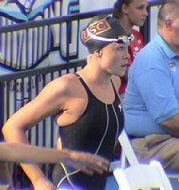 Kaitlin Sandeno: Recently I’ve tried to make it more relatable to the time that we’re in right now. A lot of the athletes that we’re talking to just had their season halted. They just got pulled out of the pool. They didn’t get their championship season. I’ve been trying to pull from moments in my own career I feel like are relatable. Whether it’s injury, illness, a car accident.I refer to those as speed bumps, they’re speed bumps because they slow you down, but they’re not stop signs. I’ve been trying to relate that this time of quarantine is just a speed bump but not a stop sign. We are going to get the green light soon and we need to do the right things to get there. We need to come together so we get there. This is not the end. There were times in my career I thought it was the end. But having that positive outlook, viewing it as just a speed bump, helps to reassess the situation. There were moments in my career when something slowed me down for a few months, but in the end I got where I wanted. I try to relate by pulling from different Olympic races that I have specific stories from when I was suffering from different illnesses or injuries. I try to relate to these athletes because I feel like a lot of times Olympians are put on a pedestal of being superhuman. We aren’t. I was raised in Southern California. I have two sisters. I don’t have a crazy, unique story. In high school, because of my family’s financial situation, I knew we couldn’t afford a major university. Swimming could get me in. You just never know what it is about your story that is going to resonate.
Kaitlin Sandeno: Recently I’ve tried to make it more relatable to the time that we’re in right now. A lot of the athletes that we’re talking to just had their season halted. They just got pulled out of the pool. They didn’t get their championship season. I’ve been trying to pull from moments in my own career I feel like are relatable. Whether it’s injury, illness, a car accident.I refer to those as speed bumps, they’re speed bumps because they slow you down, but they’re not stop signs. I’ve been trying to relate that this time of quarantine is just a speed bump but not a stop sign. We are going to get the green light soon and we need to do the right things to get there. We need to come together so we get there. This is not the end. There were times in my career I thought it was the end. But having that positive outlook, viewing it as just a speed bump, helps to reassess the situation. There were moments in my career when something slowed me down for a few months, but in the end I got where I wanted. I try to relate by pulling from different Olympic races that I have specific stories from when I was suffering from different illnesses or injuries. I try to relate to these athletes because I feel like a lot of times Olympians are put on a pedestal of being superhuman. We aren’t. I was raised in Southern California. I have two sisters. I don’t have a crazy, unique story. In high school, because of my family’s financial situation, I knew we couldn’t afford a major university. Swimming could get me in. You just never know what it is about your story that is going to resonate.
Champion’s Mojo: What was the most vulnerable thing that you shared in your book?
Kaitlin Sandeno: My freshman year at USC was hard. I went there and did not do well academically my first semester there. I did well in high school. I was always bad at math. I’m terrible at numbers. I got to USC and was like, woah. I had to go to tutors. I was hurt. I came in as a top recruit in the nation and I wasn’t even racing when I got there. That was a really hard year for me. I was embarrassed about how bad I was doing in school. I learned from those mistakes. I rebounded and I got all my grades up and graduated. That’s one of my proudest moments, graduating from USC. I think it’s those low points that make your high points special when you look back on it.
Champion’s Mojo: What are you most proud of?
Kaitlin Sandeno: Well, besides graduating, I am really proud to say I’m a two-time Olympian and four-time medalist. I’m really proud to say that I made the finals of all seven of my Olympic races. I’m really proud to say that because I feel like it’s one thing to make it to the Olympics, but to be able, at 17 at my second international competition, to be able to make it to the finals is great. I think we are in a society where it’s all about gold, gold, gold. You have to win gold. I made it to the finals in all my Olympic races. I’m really proud of that. It wasn’t just one race either. I was in multiple races. I’m proud of my foundation and the hard work that I put in at a young age that allowed me to race so many races. I know a lot of people were almost questioning my club coaches. Like, she doesn’t need to swim these other events, have her focus on the 400 IM. My coach was like, no, she’s good. She can handle this. So we went and did it. We trained for that. They had confidence in me and I’m proud of that. I’m proud of my grittiness.
Champion’s Mojo: You’ve said that it was only when reflecting back on everything you have done that you could appreciate it. Can you tell us about that?
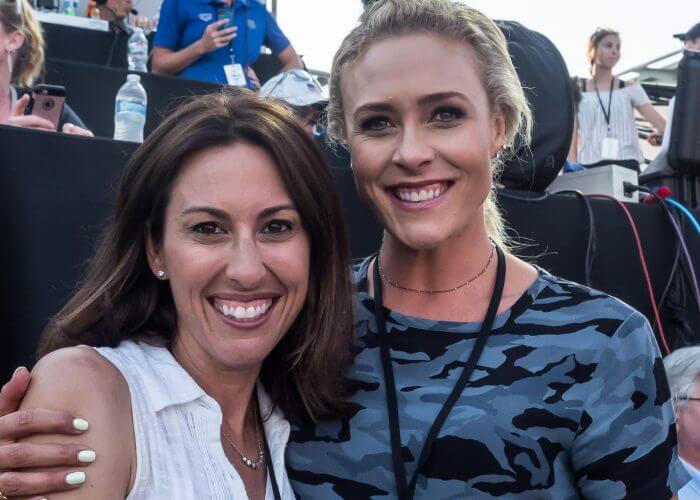
Photo Courtesy: Peter H. Bick
Kaitlin Sandeno: It’s funny because my mom and dad used to always tell me, while I was still in the sport, That they didn’t think I really realized what I’d accomplished or what I was doing. I think in the momi, you’re just doing it. It’s part of the grind. That’s what I’m supposed to do. I can honestly say after my 400 IM at the 2004 Olympics, it was like an out of body experience. That is the proudest race of my career. I remember swimming to the side of the pool and trying to find my parents in this sea of people. I had this feeling or the sensation of just not knowing what to feel. It’s the first time in my career I ever felt that in the moment. Afterwards I owned it and was proud and excited about it. But I also don’t want it to be what defines me.
Champion’s Mojo: What was your mindset when you were hurting in a painful race?
Kaitlin Sandeno: It’s funny because I feel like I always had a love hate relationship with the 400 IM. I am like, God, this is the worst event, but it’s my best. I have pride in knowing that it’s my best. It’s kind of cool to say your best event is the 400. The amount of training that goes into it is grueling. It’s insane. If I was a sprinter, maybe I would have kept going and not retired when I did. That’s not a disrespectful comment. They just do it differently. They’re in the weight room and not doing as many miles in the pool. My body was broken down. I just think it’s the way I was wired. When I was younger, my nickname was the Energizer Bunny, I just kept going. I had my dad as my biggest inspiration. He’s the hardest working person I know. It’s out body composition and it’s our mental aspect. It’s what we say to ourselves working through pain, like in a race.
Champion’s Mojo: Can you talk about that 400 IM at the 2004 Olympics? Did you actually say to yourself, “is there a lifeguard around here?”
Kaitlin Sandeno: It’s like the easiest job in the world, being a lifeguard at the Olympics. I was in so much pain. I was like, I am going to drown. But you have to keep going. It is what it is. Once you hit your hand on a wall, then you can finally rest. You just gotta finish it. You just do it. I think I have a good sense of humor and I have a good perspective on things. A lot of times it’s just music in my head that keeps me going. A lot of it too is just seeing people reacting on the side of the pool. I definitely would try to spot my coaches and see what encouragement they had for me on the side and try to feed off their energy as well. I’ve had coaches with very distinctive cheers or signals so I can either hear them or see them and that really helps.
Champion’s Mojo: Is there anything else that we haven’t covered?
Kaitlin Sandeno: Something that I became involved in during quarantine was interviewing athletes for WiSP Sports, which is one of the only global sports podcast networks for women. It’s one of the only global podcasts that works for women sports and is really cool for me to be on the other side of it and get to help athletes become more known. I’ve interviewed athletes like Amanda Beard, who needs no introduction. Cyndi Gallagher, who is a phenomenal coach with a lot of amazing insight. Then also doing athletes that were just coming out of college or maybe newer to the scene and just kind of helping elevate their voice and share their story. It’s been really neat for me to be able to use this little extra downtime in quarantine to talk to people and help us come together. Helping to share people’s stories since everyone’s is so unique. One of the things I have loved being able to do is talk to very successful student athletes. I’ve been able to interview people who were very impressive in both the classroom and pool, which is amazing to me since, as I said, I struggled in the classroom. They have such great advice that people can utilize. I’ve really enjoyed connecting on that level. The podcast is called Behind the Blocks. For me, that was a kind of outside my comfort zone. I haven’t been on this side of the podcast before. I think it’s important that we grow, especially in a time where a lot of us are uncomfortable. I’m really proud of the humans that we have in our sport. I think we have a very impressive group of young adults that have a lot to offer as role models.
Champion’s Mojo: Thank you for spending this time with us today!
Kaitlin Sandeno: It’s been my pleasure. Thank you for having me on the show!



